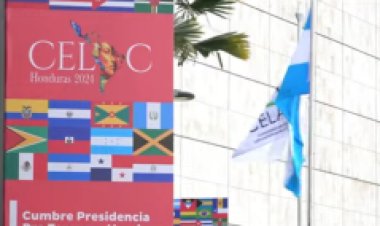Chrystia Freeland shares her biggest fear for Ukraine
"I worry about … our collective ability to stay the course," Canada’s deputy prime minister says of the world’s response to Russia.

Chrystia Freeland is not worried about Ukrainian resolve. She’s worried about the rest of the West.
Freeland, Canada's deputy prime minister and at times a key global player in the multilateral sanctions campaign against Russia, was asked at the Aspen Security Forum on Friday what concerns her most about the war on Ukraine.
"My biggest fear for Ukraine, actually, is us," she said during an armchair conversation with POLITICO editor-in-chief Matthew Kaminski. "I worry about … our collective ability to stay the course."
Freeland said her anxiety has consistently been tempered by public support in Canada and like-minded nations for Ukraine's war effort.
"Political leaders have been surprised on the upside by the commitment of their own citizens to support Ukraine," she said. "People don't have to come to the Aspen Security Forum to understand there are basic principles at stake. This is democracy versus dictatorship. This is the right of people to defend the sovereignty of their own borders."
Freeland's wide-ranging conversation with Kaminski touched on Canada’s fight against Big Tech, the role of critical minerals in the world's attempt to redefine its relationship with China, and Canada's fascination with America.
Takeaway No. 1: Canadians can't look away from the United States
Even if most Americans don't realize it, Freeland joked, Canada is their largest trading partner. Bigger than China or Japan or the U.K, combined.
Disagreements are "inevitable" given the enormity of cross-border trade. And prime ministers spend significant time managing the relationship. "We think about you guys a lot," Freeland said. "Much, much more than you think about us."
The intensity of that focus is not an accident. Canadians are immersed in American news.
“We're a government, we do polling. We're like, 'What are the top political issues you're following?'" Freeland said.
"Quite often, not just the top one, but the top one, two, three, four will be U.S. issues. I bet you, if you went to Toronto or Vancouver and interviewed people about Supreme Court decisions, primaries, Senate races, they would be maybe as well informed as their U.S. neighbors.”
Takeaway No. 2: Canada plans to collect a domestic digital services tax
Freeland reiterated Canada's intention to implement a digital services tax, which would collect revenue from tech giants with Canadian operations, as early as Jan. 1, 2024.
The United States and other OECD nations have expressed frustration at Ottawa's decision to go it alone, but Freeland was unmoved.
The minister reminded the forum that she first signaled her intention to introduce a tax in November 2020, and agreed in 2021 to delay its implementation for two years even though several major countries continued to collect similar taxes.
"That was a big concession for us," she said.
Freeland pointed to bilateral meetings at this week’s G-20 finance ministers' confab in India as evidence progress is possible on a multilateral agreement.
"We definitely are not there yet," she said. "There is goodwill on our side. There is a good understanding of Canada's concerns. We have a good understanding of the U.S. concerns and needs. And I think there is a possibility of a path forward that works for everybody."
Takeaway No. 3: Canada is not changing tack on a 'link tax' that targets Silicon Valley
Canada won't back down on a law that will eventually force large social platforms to compensate Canadian newsrooms for news links shared online, Freeland said.
Silicon Valley calls it a link tax. Google and Meta, which owns both Facebook and Instagram, have both threatened to pull Canadian news links entirely from user feeds in the country.
Canadian Heritage Minister Pablo Rodriguez has said ongoing conversations with Google have been productive, but regularly refers to Meta as a bully and intimidator.
Freeland made the case for the law as pivotal for a thriving democracy.
"The reality is, because of the economics of the web-advertising business, Canadian newsrooms are being hollowed out. And it is happening to our national news organizations. And it is happening at a local level. And it is visibly, discernibly, weakening our democracy. It's a real social and political problem."
The whole world needs to grapple with the power of tech giants who hoover up advertising revenue that could otherwise power newsrooms, Freeland said.
"This is a world problem. I think collectively, we need to figure out some legislative frameworks that ensure we can have healthy, well-resourced news organizations. At the end of the day, the resources do have to come from the tech companies."
It's not a viable option for governments to simply send cash infusions directly to newsrooms, she added. "There's a real challenge with news organizations deriving a great deal of their revenue from the public sector, from the government," she said.
Takeaway No. 4: Canada is key to the world’s critical mineral supply chains
Canada has an "outsized role to play in securing supply chains, particularly in critical minerals and metals," Freeland said.
The western world has woken up to "a recognition that the green economy needs to be built with physical stuff," she said. "It's not just about commitments. It's about lithium. It's about copper. It's about nickel. It's about zinc."
She acknowledged the widely known reality that China is decades ahead of the West.
"They've been thinking about this for 20 years, and they have quite concerning control, not only of critical minerals and metals deposits, but also of the processing," Freeland said. "We collectively have to get ahead of the game. Otherwise, we risk finding ourselves in the position that Europe found itself in last winter vis-a-vis Russian natural gas."












